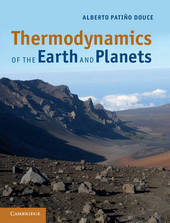
|
Thermodynamics of the Earth and Planets
Hardback
Main Details
| Title |
Thermodynamics of the Earth and Planets
|
| Authors and Contributors |
By (author) Alberto Patino Douce
|
| Physical Properties |
| Format:Hardback | | Pages:722 | | Dimensions(mm): Height 254,Width 198 |
|
| Category/Genre | Earth sciences |
|---|
| ISBN/Barcode |
9780521896214
|
| Classifications | Dewey:551.522 |
|---|
| Audience | | Professional & Vocational | |
|---|
| Illustrations |
Worked examples or Exercises; 10 Tables, black and white; 50 Halftones, unspecified; 150 Line drawings, unspecified; Worked examples or Exercises; 10 Tables, black and white; 50 Halftones, unspecified; 150 Line drawings, unspecified
|
|
Publishing Details |
| Publisher |
Cambridge University Press
|
| Imprint |
Cambridge University Press
|
| Publication Date |
25 August 2011 |
| Publication Country |
United Kingdom
|
Description
This textbook provides an intuitive yet mathematically rigorous introduction to the thermodynamics and thermal physics of planetary processes. It demonstrates how the workings of planetary bodies can be understood in depth by reducing them to fundamental physics and chemistry. The book is based on two courses taught by the author for many years at the University of Georgia. It includes 'Guided Exercise' boxes; end-of-chapter problems (worked solutions provided online); and software boxes (Maple code provided online). As well as being an ideal textbook on planetary thermodynamics for advanced students in the Earth and planetary sciences, it also provides an innovative and quantitative complement to more traditional courses in geological thermodynamics, petrology, chemical oceanography and planetary science. In addition to its use as a textbook, it is also of great interest to researchers looking for a 'one stop' source of concepts and techniques that they can apply to their research problems.
Author Biography
Alberto Patino Douce is a Professor in the Department of Geology at the University of Georgia, where he has been for almost 20 years. He has very wide research interests, which include the origin of Earth's continents, the nature of the early terrestrial atmosphere, the volatile contents of the Martian mantle and of meteorite parent bodies, the origin of life, foundational issues in classical and non-equilibrium thermodynamics, applications of statistical physics to human societies, and the reasons why human cultures repeatedly ignore the finiteness of natural resources, overreach and self-destroy. His teaching in geology, planetary sciences and thermodynamics at all levels is recognized as being unusually intense, quantitative, energetic, demanding and uncompromising, but despite this he is a frequent recipient of his department's 'Professor of the Year' award, chosen by student vote. His former Ph.D. students are pursuing a wide range of careers in academia, at NASA and in national security. He is an Associate Editor for the journal Lithos and formerly for Mineralogy and Petrology.
Reviews'... a genuine tour-de-force among geochemical thermodynamics texts. It is far broader in scope and deeper in its treatment than any others, and remarkably accessible to a broad audience of geoscientists and planetary scientists, including students. I can virtually guarantee its use at my institution for teaching by myself and colleagues in mineralogy, petrology, geochemistry and even in geophysics. It is truly a remarkable effort.' Robert Tracy, Virginia Tech '... a clear and rather comprehensive account of the thermodynamic methods used to throw light on the structure, chemical constitution and dynamics of planetary bodies ... students and scientists alike will consult it as a valuable reference work and as a rich and original source of worked applications.' Pascal Richet, Institut de Physique du Globe de Paris 'This is a superb publication, with many insightful explanations of planetary processes. It is very well produced in a clear type and with excellent illustrations, a detailed table of contents and a comprehensive index. James Hutton, who viewed the Earth as a heat engine 'capable of fusing together sedimentary rocks, causing upheavals in strata and creating mountains', would surely have relished this book.' Geoscientist 'The work is an ideal textbook on planetary thermodynamics for advanced students in the Earth and planetary sciences.' Claudia-Veronika Meister, Zentralblatt MATH
|